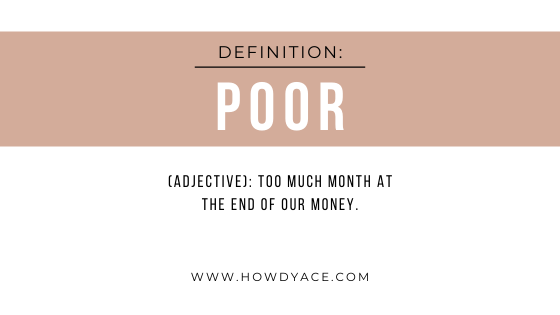
Personalized Budgets: Pre-Budget Foundations [Part 1 of 3]
Introduction:
Like all things in life, there is no one-size-fits-all plan for budgeting. Learn the foundations and create your own personalized budget in this three-part post.
Part one contains pre-budget information to build a strong foundation.
In part two, learn about the importance of emergency savings, ways to build one, and the options to store your funds.
Then, finish up part three by discovering all the different but effective budgeting strategies.
With all the information in hand, customize a personalized budget plan that works best for your personality, lifestyle, and financial goals.
DISCLAIMER: NOT FINANCIAL ADVICE
I have done my best to ensure that HowdyAce.com aims to provide accurate and valuable information on personal finance, but it may not apply directly to your individual situation.
The content on HowdyAce.com is for informational and educational purposes only and should not be understood or construed as professional financial advice.
I am not an attorney, accountant, or financial advisor/planner, nor am I holding myself out to be. The information provided is not a substitute for financial advice from a professional who is aware of the facts and circumstances of your individual situation.
Should you need such advice, HowdyAce recommends that you seek advice from a financial professional before making any serious financial decisions.

Why You Should Make a Personalized Budget
Having a budget requires us to be honest with ourselves about our spending habits. It leaves no room to hide. Some people avoid making a budget for this simple reason, they are afraid of what they will find.
I know I’ve been one to overspend on multiple occasions. In the back of my mind, I knew I would be ashamed to look at the numbers so I didn’t. The thought alone held me back from making any progress towards my life and financial goals.
As painful and as scary as it was at the time, I knew a budget was desperately needed.
Direct Your Money to the Right Places
Initially, it took a good amount of dedicated time, effort, and energy to get started. I was diving into unknown territory. Little-by-little, I learned about budgeting.
The more I learned, the more confidence I had to make informed financial decisions. I was building momentum that kept me going.
Over lots of time and practice, managing my budget became easier and easier. With a budget in place, my money gets allocated exactly where I need it to go. By setting up a strong foundation, I no longer have to be so hands-on.

A budget is like a map, directing our money to the right places. That way we don’t end up being broke or poor.
Personalized budgets allow us to practice discipline. With discipline, comes satisfying freedom as we make our way towards our financial goals.
So I encourage you to follow along and customize your own personalized budget plan!

Figure Out Your Budget Baseline
We all have to start somewhere.
Creating a baseline budget gives us clarity on where we currently stand. The information helps guide our decisions to align with our financial goals. Follow the next few steps to complete your baseline budget.
You can do this in an Excel sheet, Google sheet, an app, or with a pen + sheet of paper. I always liked Excel or Google sheets because of the incredible power to easily build upon the information if needed. But do what feels best for you.
Track Income
Make a list of all the income that comes in for the month.
Here are a few examples below:
- Active income – monthly income in exchange for services, time, or material product:
- Wages, tips, salaries, commissions, paychecks, income from small business, side job, and freelance work, etc.
- Passive income – when income is received on a regular basis with little to no additional effort after the initial blood, sweat, and tears required.
- Real estate/property, royalties, license agreements, peer-to-peer lending, etc.
- Portfolio income: dividends, interest, capital gains, etc.
- Other income:
- Child Support, social security, pensions, disability, etc.
Track Expenses
Now, it’s time to make a list of all the expenses that go out each month. The two main ways to do this is by tracking expenses over the next 2-4 weeks or reviewing past statements/spending. We can even do a little bit of both.
Fixed Expenses
“Fixed expenses cost the same amount each month. These bills cannot easily be changed and usually paid on a regular basis, such as weekly, monthly, quarterly or from year to year,” definition from TheBalance.com.
They usually take a huge chunk of our budget, like rent/mortgage, car payments, insurance premiums, etc.
Recurring Subscriptions
Don’t forget about those recurring subscriptions as well. Gym memberships, music subscriptions, Amazon Prime memberships, etc. are also fixed expenses.
My Amazon Prime account renews annually. It was always a shock when that time would roll around. Including periodic expenses in our budget can prevent this. We have so much peace of mind knowing that the expense is covered.

Variable Expenses
Here’s the definition from TheBalance.com:
Variable costs “are not considered variable because they’re discretionary. Rather, they’re ‘variable’ because the amount that you spend differs from month-to-month.”
Our variable expenses represent the daily choices that we make. Such as eating at restaurants, buying clothes, drinking Starbucks, drinking with friends on the weekend, etc.
Some other variable expenses: groceries, gas, utilities, car/house MRO (maintenance, repair, and operation), etc.
Example of Expenses
Here is a list of things to track:
- Fixed expense:
- Debt: Student loans, private loans, etc.
- Housing: rent/mortgage, insurance, fees, real estate taxes, insurance premiums, etc.
- Transportation: car payment, insurance, renewals, registration, etc.
- Recurring subscriptions:
- Monthly: Music subscription (Spotify, Apple Music, etc.), Netflix, lawn care, gym membership, etc.
- Yearly: Amazon Prime, etc.
- Variable expense:
- Food: groceries, eating out, morning coffee, etc.
- Housing: utilities, MRO, furniture, etc.
- Transportation: gas, tolls, parking, MRO, etc.
- Entertainment: drinking with friends, concerts, etc.
- Gifts: birthday, baby showers, weddings, wedding showers, Christmas, graduations, etc.

Determine the Bare Minimum/Essentials/Necessities
A crucial part of a budget is determining how much you need to survive on the bare minimum. If we had a drastic change in income, what basic necessities must be covered? What are the essential needed in order to survive?
This is the difference between necessities and discretionary spending, also known as wants vs. needs.
Wants vs. needs
Wants and needs are different for everyone. An example of this would be cell phones or home internet. Many would describe these as ‘needs’ but for a good majority of people, they are a ‘want.’
Those who work from home consider a good cell phone plan or home internet as needed. Without them, it would be hard to generate income in order to live. In most cases, phone bills and home internet would be considered a business expense.
Many of us home internet and cell phones, we use them to check social media, stream a movie, and many other personal reasons. This is why, for a majority of people, they are a want.
As painful as it might feel to live without them, we would be able to survive without these things.
Blurred lines
Another example of this is when we choose to indulge. Food is a basic necessity. But when we have the option to buy organic vs. non-organic, brand name vs. generic, or specialty items, they can turn into wants.
Yes, we need food in order to survive. But we don’t need juice after every workout, organic every-thing, or spend extra money just because of a brand.
I hate to break it to ya, but what was a ‘need’ has transitioned into a ‘want.’ I am often guilty of this.

Dave Ramsey’s Four Walls
Dave Ramsey, a well-known personal finance guru, describes this as maintaining the Four Walls.
- Food
- Shelter and utilities (mortgage, the electric bill, etc.)
- Clothing (within reason)
- Transportation (gas for the car)
If we suddenly become unemployed, divorced, have a death of working spouse, etc. these would be the first things that absolutely need to be covered.
All other expenses are discretionary and should be paid only AFTER the four walls (necessities) are covered.
Beyond the Four Walls
The four walls are a great way to get started. For my budget, I went a little beyond the four walls for my own peace of mind.
Basically, I added what I needed to ensure consistent income and reduce debt.
Since I financed my car, my car payment and insurance was a necessity. With reliable transportation, I could get to and from work in order to gather income.
My list of necessities shrunk as I paid off debt and built an emergency savings (more on that later).
Identify your Four Walls
Take some time to identify what are the absolute necessities in your budget. Here is a list to help get you started. Play with what works for your situation, add and subtract any items accordingly:
- Fixed expenses (necessities):
- Debt
- Minimum payments for student loans, private loans, credit cards
- Housing
- Rent/Mortgage monthly payment, renters/housing insurance, HOA
- Transportation
- Car payments, insurance
- Business
- Insurance, products + services
- Essential bills
- Cell phone, internet, whatever you need to survive + produce income
- Savings
- Emergency savings
- Debt
- Variable expenses (necessities):
- Housing
- Utilities
- Maintenance
- Transportation
- MRO, gas, toll, parking
- Car registration + renewals
- Food
- Groceries
- Essential bills
- Whatever you need to survive + produce income
- Housing
Total up bare minimum expenses
Once the essentials have been determined, make them distinguishable. Circle or highlight the items. If using Excel or Google Sheets, there is the option to create a new sheet in the same workbook.
It doesn’t matter how you do it. What is important is that they are distinguishable.
In case of an emergency, this will show how much is need to survive on a monthly basis. It prioritizes the expenses needing payment first. Also, it will save so much time and energy down the road.
Add up the total cost of all the essential expenses. Now we will know the bare minimum amount of income needed to stay afloat for one month.

Wrapping It Up:
Stay tuned for part two, where we will dive deep into emergency savings. Learn why they are so critical, ways to build up one up, where to keep the funds, and tools to help along the way.
If you haven’t already, it’ll be a good time to subscribe so that you don’t miss the next post!
[convertkit form=1205270]
What expenses do you overspend on?
What is one thing that you consider a ‘need’ but is actually a ‘want’?
I’d love to hear your feedback, please leave a comment below!
If you found this information helpful and know someone who could benefit, don’t hesitate to let them know. Show them how much you care and share this post with them!
Thank you so much for sharing your time and energy with me!


After tracking my expense last year I noticed I spent a lot on personal items like clothes and gifts. Also went overboard with vacations. Something that I will work on for 2020
Howdy Esteban!
Thank you for taking the time to leave a comment!
Your simple awareness is a great thing!
How will you measure your success/improvements in those categories? How will you budget for vacations in 2020?
Thanks Ace!! I for sure need to look at my variable expenses!! Thanks for pointing it out. Look forward to part two!!
Howdy Gary,
Thank you for taking the time to comment and read my post!! I’m glad that part caught your eye!
What expenses are you able to cut down on? Are there any that you can eliminate completely?
Part 2 coming soon! 🙂
Ace,
I have a lot of unneeded, maybe, hobbies!
I don’t think people realize how much the things we love cost!!
We need to look at them “real world” and maybe get a shock!!
Then motivate us to do stuff!
Thanks!!